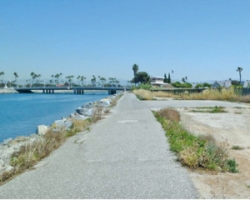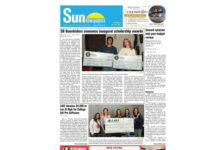The California State Lands Commission agreed last week to swap land with Bay City Partners.
Three alternate commissioners voted 2-0 on Tuesday, Oct. 15, to approve the land exchange, which eliminates a public easement issue and clears the way for a proposed residential development project to go before the California Coastal Commission.
Because the serving commissioners were alternates, only two of the commissioners were allowed to vote on the project.
State Lands staff believed there was a public trust easement on 1.168-acre land-locked portion of the property that Bay City Partners intend to develop for residential housing. Bay City Partners, who own the former DWP site, offered the commission 1.177 acres of land along the San Gabriel River and the bike trail. The owners also agreed to pay the state $2.71 million.
Commission staff recommended approval of the land swap.
Alan Gordon, California chief deputy controller and alternate for Controller John Chiang, said the issue of the development was aired out before the City Council and the council voted 5-0 to approve the project.
Gordon was apparently referring to the unanimous City Council vote on July 9, 2012 to change the zoning for the former DWP site to be developed for residential housing.
About 30 years ago, Seal Beach zoned the property for 70 percent open space and 30 percent hotel development. The exact boundaries of the 70 percent were never clearly defined. Seal Beach opponents of the project have remained adamant that the project be developed as originally zoned.
Gordon said it was not the State Land Commission’s job to determine the use of land in the coastal zone. He said it was also not the Sac’s job to overrule local government land decisions.
Gordon told the public several times during the meeting that the only issue before the SLC was whether the land swap was in the state’s interests.
Ermine Ortega, chief deputy director and for the state Finance Department, said that if a hotel wasn’t sought for the property in the past 30 years, when development and tourism were booming, it was hard to imagine it happening today. Ortega moved to approve the project. The motion was seconded and carried.
Residential versus hotel
State Lands staff attorney Catherine Colson presented the staff report to the commission. She said staff valued the public easement portion of the property at $2.71 million. She said staff reached that figure by subtracting the potential difference between the values of the residential development of the project area from the potential hotel development.
However, Nancey Kredell, a long time opponent of the project, said she didn’t know where SLC staff got that figure. She said the developers would make $11 million from the 1.168-acre portion of the land that was subject to the public easement. Kredell urged the State Lands Commission to deny the land swap.
“The reason we’re opposed to this is that we aren’t given the sane property we were promised before,” Kredell said, apparently referring to the original zoning the city imposed on the property.
“They want a passive park,” she said. “We want an active park.”
Gordon asked if there was a hearing before the City Council.
Kredell said she was on the DWP advisory committee and all the committees voted to turn down the residential project. But the Planning Commission, which she said was under the thumb of the City Council, approved it. She said the land being swapped was not of equal value.
Theresa Henry, representing the staff of the Coastal Commission, also asked the State Lands Commission to deny the land swap. Henry said staff does not believe the land swap was necessary. She said CCC staff did not agree that a hotel development was not feasible. She said that even if a hotel wasn’t feasible, CCC staff believed some other visitor-serving commercial use would be feasible.
Gordon said that under the residential development plan, Seal Beach would get 6.4 acres of parkland and access to the river versus the theoretical access to open space if a hotel were built.
“A hotel’s private property,” Gordon said. “They don’t have to let anybody on their property.”
Henry said a park would be good, but CCC staff believes the entire area could be developed for commercial use, which the Coastal Act considers a priority.
Henry said she was at the hearing on behalf of the Coastal Commission staff, not the commission.
Ed Selich, project manager for Bay City Partners, said the property owners disputed the existence of the public easement but decided to negotiate a land swap with the state rather than fight the issue.
He said the land in question is cut off from the water and of limited value. He also said the owners believe that no commercial uses of the property are feasible.
Mel Nutter, who said he represented Seal Beach for Open Space, testified against the project, did not agree that the public easement parcel was relatively useless and also questioned the study that said a hotel was not feasible.
“What we’ve got is a difference between feasibility and profitability,” Nutter said. According to Nutter, the study improperly emphasized profitability.
“We think that’s a really important distinction,” Nutter said.
Gordon asked about the city’s efforts or lack of them to have a hotel developed on the property.
Jim Basham, director of Community Development, said the property was identified for hotel use 30 years ago. Later, the city designated the site for redevelopment as an enticement for a hotel development.
He said the property was vacant for 30 years. He said when redevelopment doesn’t take place, planning departments across the state look at other uses.
Basham said you couldn’t allow a parcel to remain substandard. He said having 6.4 acres of recreation land was a tremendous opportunity. This was apparently a reference to the Bay City Partners’ agreement to give 6.4 acres of their property to the city as part of allowing the property to be developed for residential use.
Kredell said they weren’t really giving the city 6 acres.
State Lands Commission Executive Officer Jennifer Lucchesi said the commission’s appraiser reviewed the feasibility study and two other studies, one by supporters and the other by opponents of the project, and concluded that the Bay City Partners’ feasibility study was based on reasonable assumptions.
Carla Watson, a member of the city’s Recreation and Parks Commission, asked if the developers really tried to find a hotel use for the land or waited for the opportunity to threaten the city with a lawsuit.
She said the developer threatened to cut off access to the beach and the city filed a lawsuit. She said the city attorney at that time was inept and didn’t like to go to court.
Watson was apparently referring to an eminent domain action filed by the city against the Bay City Partners that argued that the city needed guaranteed access to a sewer line. The BCP counter-sued and a judge ordered the opposing sides to negotiate. The settlement of the suit became as controversial as the property development.
Watson said the BCP were allowed to purchase the property as it was—zoned for hotel development.
She told the State Lands Commission that when cities haven’t done the right thing, whether it is Bell or Seal Beach, it was up to the commissioners to step in and do the right thing.
Acting State Lands chair Gordon said it was up to the Coastal Commission to decide what is appropriate development in the coastal zone.












